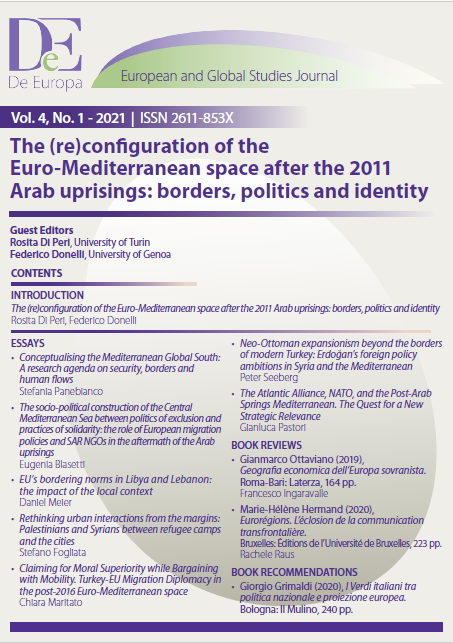The socio-political construction of the Central Mediterranean space between politics and humanitarian practices: the role of NGOs and European migration policies
Abstract
Since 2014, the involvement of Non-Governmental Organizations (NGOs) in Search and Rescue (SAR) activities has been gradually changing and reshaping the socio-political scene in the Central Mediterranean (Cuttitta, 2018). European migration policies, on one hand, and NGOs’ humanitarian action, on the other, have contributed to a double redefinition of the Central Mediterranean space, as both a place of exclusion and hospitality, where state sovereignty and the need to respect human rights clash.
While European migration policies - emphasizing the political-ontological separation between the space inside and outside national borders (Di Cesare, 2017)- define the central Mediterranean space as a place of exclusion, where politics of border control and externalization of SAR activities to Libya prevail in the name of security, NGOs’ humanitarian intervention questions and oppose such an approach, redefining the political space of the Central Mediterranean from a humanitarian perspective, in which hospitality becomes the priority. In this sense, the Central Mediterranean space, produced by the social and political actions (Lefebvre, 2018), implemented in order to cope with the migratory phenomenon, and defined by the political and social values that these practices entail, assumes a dual identity and becomes, in Foucauldian terms, an heterotopia, representing in one real place -the central Mediterranean sea- incompatible spaces (Foucault, 2006), symbolizing the impasse between politics and ethics (Di Cesare, 2017) in the management of the migratory phenomenon in the Central Mediterranean region.
Drawing on Lefebvre's theorisation of space as a social product that does not pre-exist human beings, rather it is built and shaped by them, and Foucault’s notion of heterotopia, this paper proposes to analyse the role that both European migration policies and NGOs’ humanitarian SAR activities play in the socio-political construction of the Central Mediterranean, where the need to ensure human rights deeply clashes with the reaffirmation of the nation-state and its sovereignty, leading to the reconfiguration of the Central Mediterranean area as a space of representation, in which exclusion and hospitality coexist.
Keywords: Central Mediterranean space, EU migration policies, SAR NGOs, politics of exclusion, practices of
solidarity



 The journal has been approved for inclusion in DOAJ. The DOAJ listing of the journal is available at
The journal has been approved for inclusion in DOAJ. The DOAJ listing of the journal is available at 
